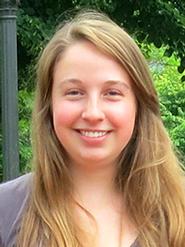
While planning her study abroad experience in France, Mary (Caroline) D’Ambro ’15 developed a deep interest in the political system of the country, particularly in the Common Agricultural Policy (CAP) that has affected the European Union (EU). In her research sponsored by the Arthur Levitt Public Affairs Center, D’Ambro will study the past, present and future of this European agricultural policy.
In order to maintain stable food supplies and prices to ensure a proper standard of living for farmers, the CAP was established in 1962. This was the first integrated policy among EU countries, and pooling funds to create a single budget concerned many citizens and policymakers at the time.
The program consists of food subsidies and price guards that ensure farmers are paid a fair wage and encourage the purchase of nationally grown foods. By raising the prices of imported agricultural products, the government hopes to stimulate support for local farmers.
D’Ambro stumbled upon this controversial topic in a course taught by the Henry Platt Bristol Professor of International Affairs Alan Cafruny. Her interest was immediately piqued when Cafruny, an EU specialist, introduced the subject, and she knew she would enjoy studying it in more depth with him this summer.
D’Ambro will begin her research by examining the period before the policy was put into place to discover why it was necessary. WWII reduced both productive land and labor, causing a decrease in agricultural production and resulting in widespread famine, especially in Greece.
While the average human needs roughly 2,000 calories a day, rations during this time ranged from only 1,200 -1,500 calories, a “scary thought,” according to D’Ambro. These are “topics that I never would have thought to consider,” before she took the course with Cafruny.
The policies of the CAP have been reformed multiple times since it was initiated. D’Ambro wants to look at these adjustments and see how they relate to the overall development of the EU. She believes that the constant transformation of the CAP is “symbolic of the continued trajectory of progress in modern Europe.”
Market distortions, which the CAP introduces, cause unanticipated and often undesirable consequences. This program sets agricultural prices artificially high and encourages more farmers to stay in the industry than free markets would typically dictate. Third world countries that rely on agricultural exports to sustain their economies also suffer, as they are not receiving equivalent support to maintain higher production levels. These agricultural commodities become relatively more expensive compared to the subsidized French options.
In addition to causing harm to consumers and other countries, the policy can also damage the land. D’Ambro explains that older subsidies, “encouraged farmers to grow as much as they possibly could, since they knew the government would purchase the surplus.” This led to the overuse of hormones, fertilizer and an unsustainable approach to land use.
D’Ambro plans to end her research by looking at future implications of the policy. The Transatlantic Free Trade Area (TAFTA) may introduce additional issues, and she will analyze what steps may be taken to address these subsequent challenges.
D’Ambro will spend next year with the Hamilton program in France. She finds the country’s politics interesting, and wants to be well-versed on France’s system before immersing herself in its culture. While on campus, she works for the Music Department, is a member of the orchestra and brass ensembles and takes French horn lessons.
D’Ambro is a graduate of Hoosic Valley High School (Schagticoke, NY)
Posted July 5, 2013
